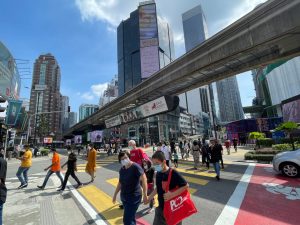Are Malaysians the problem with Malaysia?

Why do some Malaysians think Malaysia is doing so poorly as a country when the data and economic indicators tell a different story.
(The Star) – A CLOSE friend, Kevin Christopher, a prominent analyst with an investment firm in Kuala Lumpur, recently posted a question in a WhatsApp group chat.
He asked (and I paraphrase) why some Malaysians think Malaysia is doing so poorly as a country when the data and economic indicators tell a different story.
I also recently discussed this with some clients, and almost all of them were pessimistic about Malaysia. The constant refrain is the falling ringgit, rising cost of living, labour shortages and political instability tell a story of a nation in decline.
Some Malaysians – maybe more than some – are rushing to trade their citizenship with Singapore, Australia and the United Kingdom.
And the comments online, especially on articles shared by pessimists, are roundly negative.
Malaysians who have left for greener pastures also enjoy hitting out at Malaysia and find the need to share negative news about Malaysia to validate their departure.
The less critical-thinking Malaysians swallow this “Malaysia is a failed state” narrative hook, line and sinker.
What troubles me more is that when data, facts and figures are shared (and most of the time, this is from reputable local and international organisations) to counter the failed state narrative, it is dismissed by the pessimists because it does not fit their preconceived notions. The wall of cognitive bias prevents any counter-narrative.
Also, years and years of “Malaysia is a failed state” sloganeering by one of the country’s largest political parties has led us down this path – that even Malaysians in Malaysia think that the country is hopeless.
All of this got me thinking, are Malaysians the real problem with Malaysia?
Malaysia is a young nation with a large section of the population under 45.
Malaysia is also probably one of the most diverse nations globally – ethnically, religiously, linguistically and geographically. Managing this diversity is a challenge, and less diverse countries have failed.
Another complaint by Malaysians who dislike Malaysia is why are we not “advanced” like South Korea, Singapore or Taiwan, even though all of us were collectively economic backwaters in the 1970s.
South Korea is a rich country but with copious social ills – watch a K-drama, and you will know that.
Singapore is wealthy, but it lacks democratic legitimacy.
Taiwan is the semiconductor factory of the world but remains trapped in its battle with China.
All of this tells us something – every country has its good points and not so good points. Each country is unique in its way of doing things. Each country has its problems, and it will need to find its solutions.
We must focus on Malaysia’s problems and how we solve them.
In May 2018, Malaysians took a leap of faith and witnessed the country’s first change of government since independence. Despite being on the losing side, I said back then, I continue to believe it was a good thing that it happened.
Malaysians have proven that we can have an orderly and seamless transfer of power. After that, we witnessed two other government changes – both peaceful and structured.
No one can doubt that the Covid-19 pandemic battered Malaysia. The government (like all other governments) spent copious amounts of money to provide aid and assistance for those hit by the lockdowns to battle Covid-19.
We are now starting to recover, and the recovery will need all Malaysians to pull together.
Despite the economic headwinds, Malaysia recorded RM2 trillion in total trade for 2021. According to the International Trade and Industry Ministry, Malaysia attracted RM208.6bil in foreign direct investment and RM97.8bil in domestic direct investment in 2021.
Further, Malaysia attracted RM148bil in approved investment in the electrical and electronics industry with 75 capital-intensive projects valued at RM100mil or more.
Porsche opened its first foreign plant in Kulim, Kedah.
Austria’s AT&S chose Malaysia for its first manufacturing plant in South-East Asia. AT&S is a global leader in printed circuit board manufacturing and integrated circuit substrates.
Foxconn plans to build a chip fabrication plant in Malaysia in partnership with a local tech firm called DNex.
According to International Trade and Industry Minister Datuk Seri Azmin Ali, all this investment will generate close to 80,000 well-paying jobs for Malaysians.
So, let us ask ourselves this question, can a failed state do all of this?
I am not saying Malaysia is bereft of problems. Our leaders must do a lot more if we are to become a truly globalised and equitable high-income nation. Covid-19 did set us back, but Malaysia is also bouncing back.
Most importantly, the government must work harder to ensure fairer income distribution, lessening the economic disparities, eradicating corruption and future-proofing against pandemics and climate disasters.
Also, the recent depreciation of the ringgit is a cause for concern, but a large part of it is attributed to global factors.
Nonetheless, with recovery comes resilience. As we recovered after the Asian financial crisis and the global financial crisis, we will also recover from this one.
There is a lot more work to do, but this will only happen if Malaysians believe in Malaysia.
The negativity that has engulfed us is terrible. We are the “can-do” nation. We need to remember this always. We have overcome in the past, and we will continue to overcome in the future.
Ivanpal Singh Grewal is an advocate & solicitor. He was formerly political secretary to the Plantation Industries and Commodities Minister.

